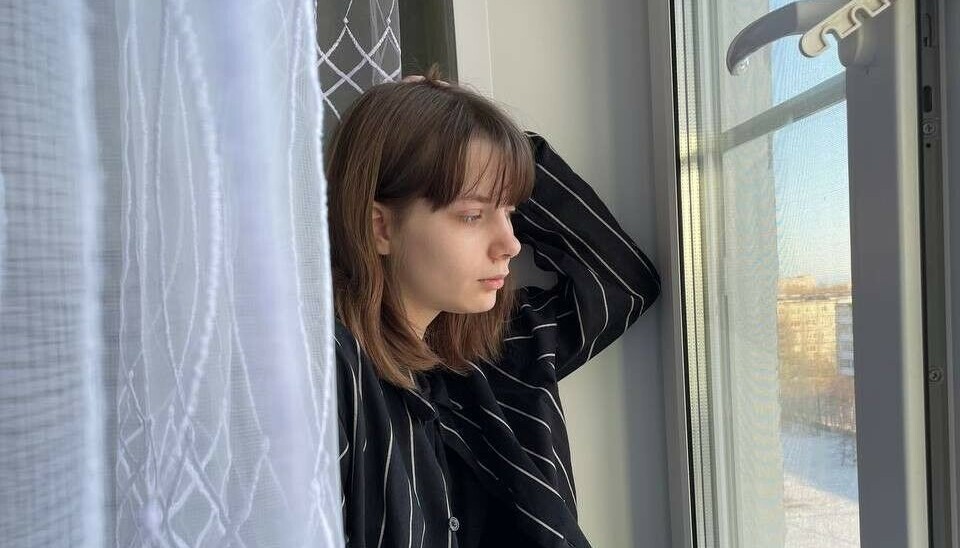
“Let the whole world know that there are people like my daughter.” Snitches and a sledgehammer: the case of Olesya Krivtsova
A 20-year-old student from Arkhangelsk faces 10 years in prison for anti-war posts. She has been reported to the police by a criminal who dreams of killing gays.
Mother
On February 12, Olesya Krivtsova, a student at the Arctic Federal University, or NarFU, celebrated her 20th birthday under house arrest with an electronic bracelet on her ankle. Olesya has been charged with discrediting the Russian army and justifying terrorism and she’s been put on the federal register of extremists and terrorists.
Barents Observer spoke to Olesya’s mother, Natalya Krivtsova. During the conversation, Natalia is in the same apartment in Severodvinsk with her daughter, but Olesya cannot be asked any questions: in addition to house arrest, the court forbade the student to use any means of communication.
Olesya and her mother opposed the war in Ukraine from the very beginning. But Natalya was sure that nothing threatened their family, because they did not violate anything: they simply called a spade a spade.
But one day Olesya, as her mother puts it, “did a terrible stupidity.” On May 9, she put up leaflets reading that there were WWII veterans also in Ukraine. Olesya was identified by surveillance cameras, found and held by the police for ten hours.
“She was dragged out of the house almost in her underwear. She was not allowed to call either a lawyer or her family. They didn’t give her any food. They threatened that I’d be fired, they threatened to send her to prison. In the end, they forced her to apologize to the Russian Armed Forces on camera. Of course, she was scared and agreed - as everyone who got there did. This video hasn’t surfaced anywhere yet; obviously waiting in the wings…
When I saw her she was completely broken. But she came out, and her first words were: “Now I understand that everything was right”,
— Natalya recalls.
Back then it all ended in an administrative case, but in December 2022 criminal charges were brought up. On December 26, security forces broke into the apartment where Olesya lived with her husband. The student was laid face down on the floor, and one of the uniformed men loomed over her with a sledgehammer. It was a “hello” from the Wagner PMC, Krivtsova was explained as she was driven for an interrogation.
Olesya is charged with discrediting the army and justifying terrorism. The prosecution believes that the post of Kryvtsova’s friend, Ilya Leshukov, about the university forcing its students to participate in rallies in support of the so-called referendums in the occupied territories of Ukraine, discredited the Army. Olesya shared this post in a private chat with fellow students, accompanying it with a one-word comment: “Konchelygi”. It is derived from the word “konets”, meaning end or finish, and can be loosely translated as “someone beyond redemption”.
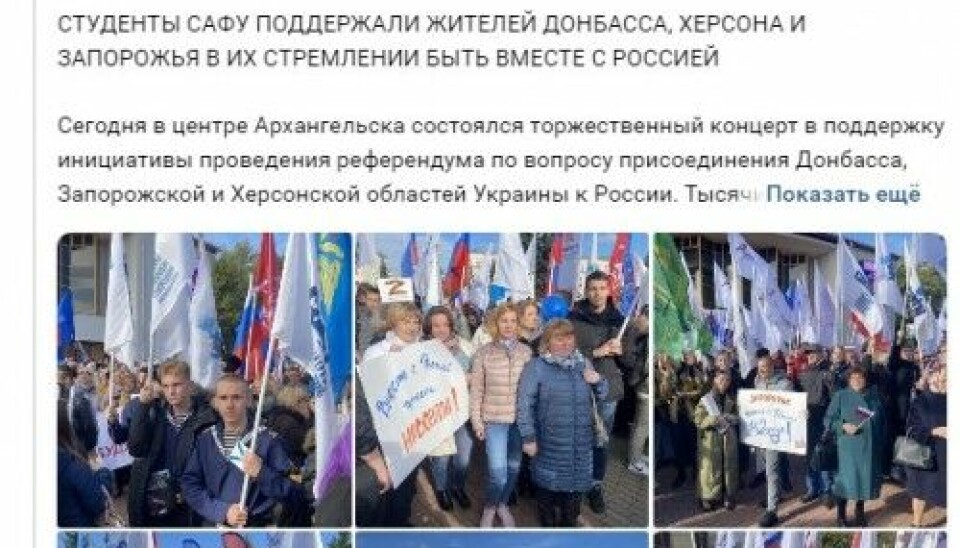
“They carried out a psychological and linguistic examination of the word “konchelygi”, producing a 20-page report, which stated that this word negatively characterizes the Russian Armed Forces,” Natalia explains. “In short, the Armed Forces were offended by the word addressed to the leadership of the university and the students who had gone to the rally.”
In Olesya’s case there are also publications from the VK social media network and screenshots from Instagram. Krivtsova posted instructions for surrender for soldiers and pictures of dead people on her social media. Her fellow students shared these posts with each other in another chat that Olesya was not in. The students said that it was necessary to report Krivtsova, and discussed how best to do this (Barents Observer has screenshots of the exchange).
“I read and re-read this exchange for 40 minutes. Then I called my daughter and said: “Olesya, it will be bad.” I realized that people perceived reporting others as something normal,” says Natalia.
Informer
Krivtsova was placed under house arrest for an attempt to buy tickets to the south of Russia. Her family claims that Olesya did not buy them and she was physically unable to travel anywhere because of a torn page in her passport. They don’t know where the tickets came from. But what is known is who reported the alleged escape plans. It was Timur Bulatov, a homophobe from St. Petersburg, who heads the First Moral Russian Front and the Foundation for the Struggle for Morality and who had earlier been convicted of misappropriation.
Bulatov presents himself as a metal artist, but journalists call him Russia’s main snitch. He features as the initiator or applicant in many criminal cases across the country: “When it got over twenty, I stopped counting,” says Bulatov. His main target is the LGBT community and anti-war activists such as Olesya Kryvtsova.
Bulatov claims that it was he who initiated the case against Krivtsova — he called the police and told them about the student’s posts.
— They had a look and said: yes, there are elements of a crime, there is justification of terrorism and a lie about the special military operation. And we will find a claimant here ourselves.
Bulatov says it was him who reported Olesya’s intention to go abroad. He used one of his several fake accounts on the Telegram messaging app to get into a thematic chat where Krivtsova’s case was discussed.
“It was a chat of fugitive lesbian feminists who are hiding from criminal prosecution in Georgia,” the snitch says with a laugh. “But you can’t just give everyone the opportunity to leave without a demonstrative punishment. Krivtsova should be all about lovey-dovey but she does all sorts of crap instead.
According to Bulatov, he has contact persons in every major city, mainly in counter-extremism police units.
— I don’t write complaints. I just call directly, say what needs to be done and send a link in a messaging app to the material that needs to be worked on. And that’s it.
Bulatov says he gets the materials from “comrades-in-arms” and “acquaintances”. According to him he does this work on a voluntary basis: “We need to clean the country from an internal enemy.” At the same time, he does not like being called a snitch; he believes that snitching is when people complain about him, while he only reports crimes.
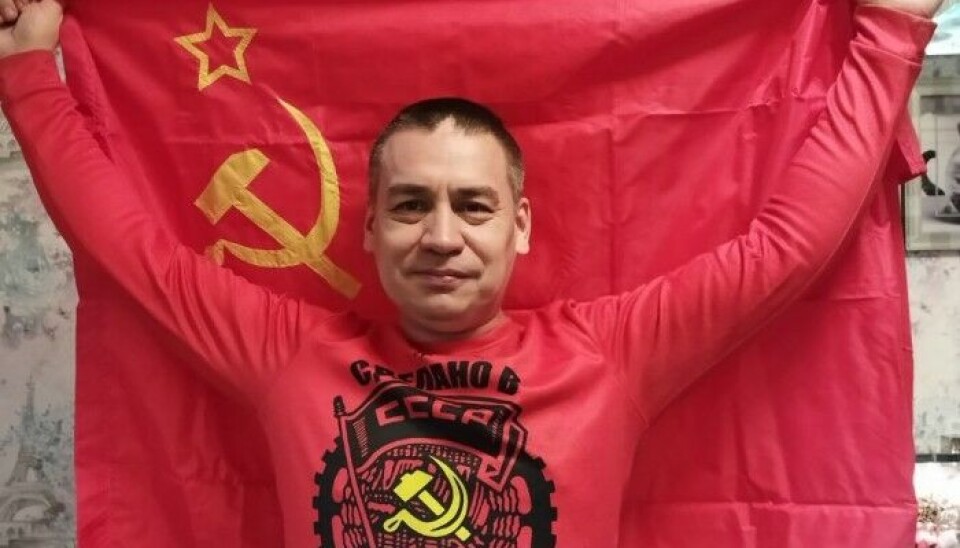
Bulatov calls Olesya Krivtsova an LGBT activist, although the student does not consider herself one. Referring to his “psychiatric consultants” Bulatov claims that pedophilia flourishes among homosexuals, that it is they who commit the majority of sex crimes against children.
In his posts, he lashes out mercilessly at his victims. And talking to Barents Observer, Bulatov admitted that he dreams of being allowed to kill gays. The man happily described exactly how he would dispose of LGBT people, but finished by saying that he is a law-abiding citizen and does everything “by the law.”
The fighter for public morality was on the federal wanted list for several years for embezzlement of funds in the company he worked for. Bulatov was also accused of robbing women he was in a relationship with. More recently, in December 2022, Bulatov provoked a major car accident; journalists claim that Bulatov had his driver’s license taken from him and was drunk when he got behind the wheel.
Possible snitches
Timur Bulatov is not the only person involved in Krivtsova’s case. Names of several NArFU students are being mentioned in the news media and social networks: Roman Hussein, Daniil Bugay and Viktor Baev. They discussed the idea of reporting Olesya in a private chat - and, perhaps, they did. Bugai’s name was brought up by the investigators in court: the young man had complained to them that he was being bullied.
At the end of December, Olesya’s husband Ilya Melkov, also a NArFU student, was asked to come to the university under the pretext of meeting with one of the professors. Instead, he was met by an officer of Police Center for Combating Extremism, whom Ilya had seen at the search a few days before.
“He asked me to speak on camera and say that I don’t consider people who are reported on the Internet to be snitches as snitches,” says Ilya in an interview with the Barents Observer. “I said I wouldn’t say that. But I was still scared, so the video was recorded after all. We compiled the text jointly with the police officer. I said that there was no reliable information about reports and that there was no need to show any aggression towards these people, let the law enforcement deal with it.”
— Ilya said.
This video has not been made public yet either. The policeman demanded that Melkov not talk about this meeting anywhere. Ilya says he is afraid of the consequences, but he told this story anyway, because he is sure that there is nothing to punish him for.
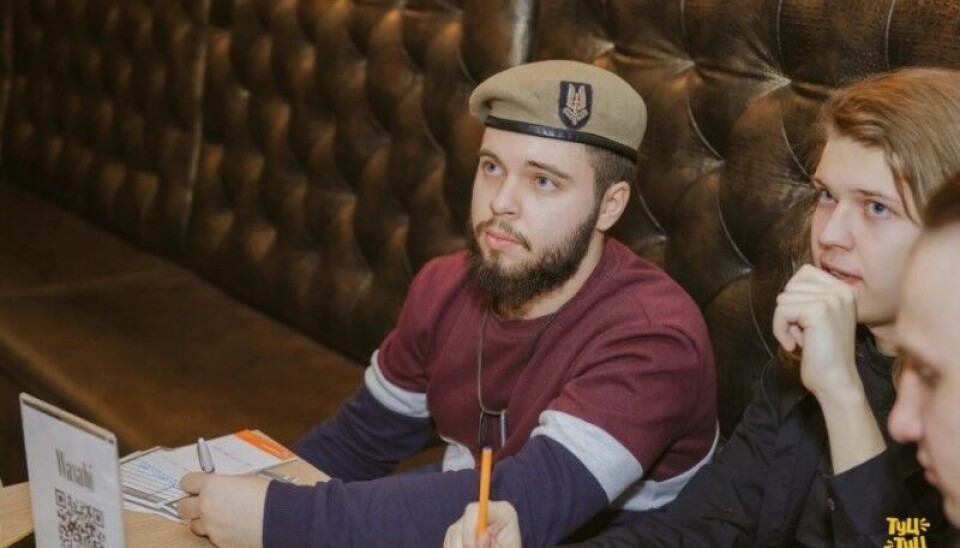
The students who allegedly reported Olesya Krivtsova study at the Faculty of History. Baev and Bugai are members of an airsoft group that presents itself as a military patriotic squad. Natalya Krivtsova emphasizes that they do not know for certain who exactly reported her daughter and whether these reports even existed. The Barents Observer wrote to Baev, Gusein and Bugay asking them to comment on their involvement in the Krivtsova case. Baev read the message but did not respond. The two others haven’t read the messages, but Guseyn then restricted who can write to him.
Friends
“Freedom for Olesya Krivtsova!” is the name of the Telegram channel about her criminal case. It was created and is run by another native of the Arkhangelsk region, Ilya Leshukov. He also organized a fundraising campaign to pay for her lawyer. According to Ilya, hundreds of people agreed to help. Some wired as much as 20,000 to 30,000 rubles while some sent a few tens of rubles - “the last money”, the activist believes.
Leshukov is the same age as Olesya. He was one of the first in the Arkhangelsk region to face persecution for his anti-war stance. In March, his apartment was searched several times, after which he left the country and is now in Georgia.
Natalya Krivtsova says her daughter is supported by a huge number of people.
“When all this horror happened, a lot of people heard her,” says Natalya Krivtsova. “In fact, there are doubters; and for those who know Olesya, everything turned around and they began to change their position. People write, call, express words of support. Earlier it was just the two of us – me and Olesya. And it turns out there are a lot of us.
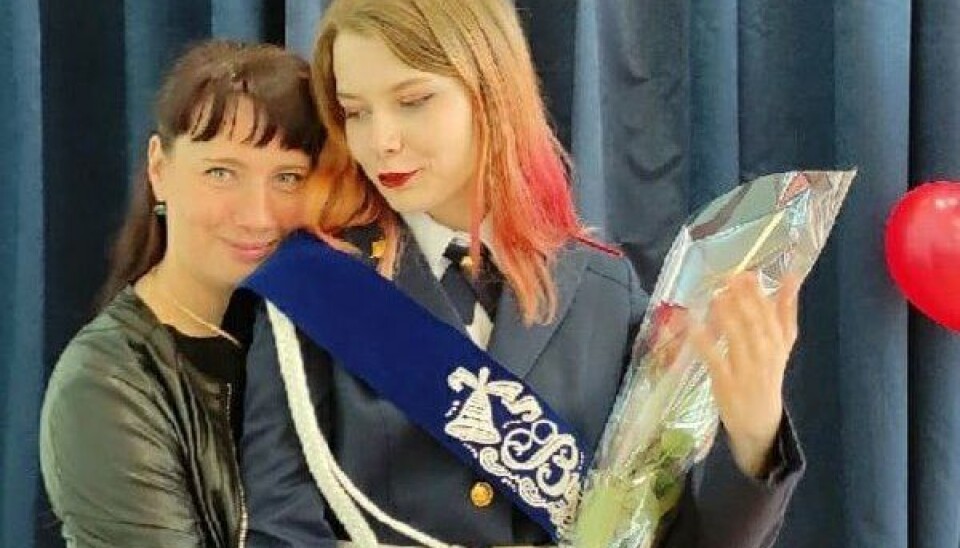
Olesya is not allowed to use the Internet and telephone, but she can receive guests. Many people came to her on her birthday, “a full house”, her mother said.
“A cake is brought to the table. Everyone is sitting, everyone is on a healthy lifestyle, drinking lemonade. There are no journalists today, but friends have come,” says Natalya.
The phrase about journalists is not accidental. The attention of the whole world is on Krivtsova today. Two days before Olesya’s birthday the court had a hearing to extend her pre-trial restrictions which was attended by journalists from the BBC, the New York Times and Norway’s Aftenposten. On the same day, February 10, Russian President Vladimir Putin visited the Arkhangelsk Region; but his visit was covered mainly by the state media.

State media journalists did come to court too. A one-minute report about the event was released by the state-owned regional Pomorye TV. However, Olesya’s mother came to the conclusion that they were not particularly interested in her daughter’s case.
—“They asked two questions: what foreign journalists think about the special military operation and what they think about deliveries of heavy weaponry to Ukraine. And they said in the broadcast that the foreign media chose an “ordinary” hearing on extending pre-trial restrictions out of the entire number of court hearings!
Nevertheless, hundreds of other news outlets do not consider Olesya’s case to be ordinary. Natalya says that the media from 28 countries have already written about her daughter. And she is happy about it.
“All these people abroad who think that all Russians are bad - let them see that there are people like Olesya. When you think that your daughter is facing ten years in a Russian prison… But there is one person, who I think is great, who said that he himself is not afraid, and asks others not to be afraid. This, you know, is like death: you know that it exists, but you always think that this will not happen to you. Fear must be fought.
This is a story written by two of the Barents Observer’s exile-Russian journalists. Based in Norway, they can continue to report and publish stories that are unlikely to be published by censored media inside the country. Please support our independent reporting, today more important than ever. The Barents Observer is a non-profit newspaper publishing in both Russian and English.















